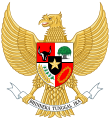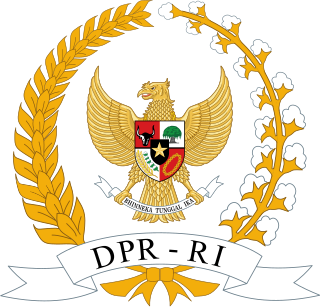
The House of Representatives of the Republic of Indonesia is one of two elected chambers of the People's Consultative Assembly (MPR), the national legislature of Indonesia. It is considered the lower house, while the Regional Representative Council (DPD) serves as the upper house; while the Indonesian constitution does not explicitly mention the divide, the DPR enjoys more power, privilege, and prestige compared to the DPD.

The Communist Party of Indonesia was a communist party in the Dutch East Indies and later Indonesia. It was the largest non-ruling communist party in the world before its violent disbandment in 1965. The party had two million members in the 1955 elections, with 16 percent of the national vote and almost 30 percent of the vote in East Java. During most of the period immediately following the Indonesian Independence until the eradication of the PKI in 1965, it was a legal party operating openly in the country. Accused of responsibility for the 1965 army-led coup attempt, the party was banned by General Suharto in March 1966.
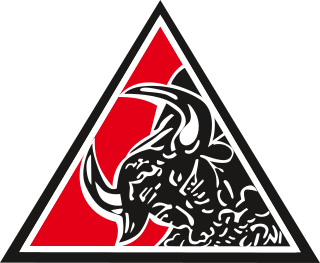
The Indonesian National Party was the name used by several nationalist political parties in Indonesia from 1927 until 1973. The first PNI was established by future President Sukarno. After independence, the new PNI supplied a number of prime ministers, and participated in the majority of cabinets in the 1950s and 1960s. The party was fused into the Indonesian Democratic Party in 1973. In the years following the reforms of the late 1990s, a number of parties claiming to be the continuation of previous PNIs stood in elections, but gained only a handful of seats.

Guided Democracy, also called the Old Order, was the political system in place in Indonesia from 1959 until the New Order began in 1966. This period followed the dissolution of the liberal democracy period in Indonesia by President Sukarno, who centralized control in the name of political stability. He claimed to have based the system based on the traditional village system of discussion and consensus, which occurred under the guidance of village elders. On the national level, however, this meant centralized rule under Sukarno: martial law, a massive reduction in civil liberties and democratic norms, and the Indonesian National Armed Forces and Communist Party of Indonesia acting as major power blocs.

The Constitutional Assembly was a body elected in 1955 to draw up a permanent constitution for the Republic of Indonesia. It sat between 10 November 1956 and 2 July 1959. It was dissolved by then President Sukarno in a decree issued on 5 July 1959 which reimposed the 1945 Constitution.

The Council of Indonesian Muslim Associations Party, better known as the Masyumi Party, was a major Islamic political party in Indonesia during the Liberal Democracy Era in Indonesia. It was banned in 1960 by President Sukarno for supporting the PRRI rebellion.

The Liberal Democracy period in Indonesia, also known as the Era of Parliamentary Democracy, was a period in Indonesian political history, when the country was under a liberal democratic system. During this period, Indonesia held its first and only free and fair legislative election until 1999, but also saw continual political instability. The period began on 17 August 1950 following the dissolution of the federal United States of Indonesia, less than a year after its formation, and ended with the imposition of martial law and President Sukarno's decree, which resulted in the introduction of the Guided Democracy period on 5 July 1959.

Legislative elections were held in Indonesia on 29 September 1955 to elect the 257 members of the House of Representatives. The election was the first national election held since the end of the Indonesian National Revolution, and saw over 37 million valid votes cast in over 93 thousand polling locations. The result of the election was inconclusive, as no party was given a clear mandate. The legislature which was elected through the election would eventually be dissolved by President Sukarno in 1959, through Presidential Decree number 150.

Legislative elections were held in Indonesia on 3 July 1971, the first under the New Order regime. There were ten participants; nine political parties and the "functional group" Golkar, which came first with more than 60 percent of the vote, resulting in an absolute majority in the People's Representative Council.

The First Amir Sjarifuddin Cabinet was the fifth Indonesian cabinet and was in office from 3 July to 11 November 1947.

The Djuanda Cabinet, also known as the Working Cabinet, was an Indonesian cabinet that served from 9 April 1957 until 10 July 1959, when it was dissolved by a decree from President Sukarno.

The National People's Party, initially founded as the Indonesian National Party–Independent, was a political party in Indonesia. It was founded on 23 July 1950 after a split within the Indonesian National Party (PNI). The divisions with the PNI had appeared at the party congress in May the same year, when Sidik Djojosukarto's followers had emerged victorious. Djody Gondokusumo was the chairman of the party.
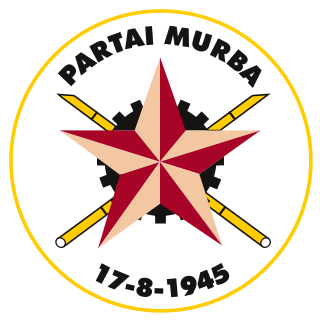
Murba Party was a 'national communist' political party in Indonesia. The party was founded by Tan Malaka, Chairul Saleh, Sukarni and Adam Malik in 1948. The history of the party was largely intertwined with that of the powerful Communist Party of Indonesia (PKI). Initially relations between PKI and the Murba Party were fluid, but gradually the two parties developed into each other's arch-enemies. The Murba Party continued to exist under the New Order, but was merged into the Indonesian Democratic Party in 1973.

The Central All-Indonesian Workers Organization was the largest trade union federation in Indonesia. Founded during the period of the country's independence in the late 1940s, the federation grew rapidly in the 1950s. It was initially formed with loose connections to the Communist Party of Indonesia (PKI) and with members from other parties, but over time, the PKI became dominant in the organisation. With the introduction of President Sukarno's guided democracy in the late 1950s, SOBSI was formally recognised and given a place in the national decision-making structures. In the 1960s, SOBSI came into conflict with the Army, whose officers controlled the country's state enterprises. After the 1965 coup that subsequently produced Suharto's New Order regime, SOBSI was declared illegal, its members killed and imprisoned and most of the leadership executed.

The League of Supporters of Indonesian Independence was a right-wing nationalist political party in Indonesia established by former Army head General Abdul Haris Nasution as a vehicle for the Indonesian Army to enter the realm of politics. It was influential in persuading President Sukarno to introduce Guided Democracy in Indonesia and return to the 1945 Constitution.
The Indonesia Party, better known as Partindo, was a nationalist political party in Indonesia that existed before independence and was revived in 1957 as a leftist party.

Sartono was an Indonesian politician and lawyer who served as the first speaker of the People's Representative Council (DPR) from 1950 until 1960. Born to a noble ethnic-Javanese family, Sartono studied law at Leiden University. During his studies, he joined the Perhimpoenan Indonesia association and became an advocate for Indonesian independence. After graduating, he opened a law practice and helped found the Indonesian National Party (PNI) in 1927. When several party leaders were arrested by the colonial government in 1929, he became one of their defense lawyers and unsuccessfully argued for their acquittal. Following the arrest of its leaders, PNI became paralyzed and the party subsequently suspended its activities. In its place, Sartono founded a new political party, Partindo, which sought to achieve independence through non-cooperation and mass action. Partindo lasted until 1936, when it decided to dissolve itself. After Partindo's dissolution, Sartono helped found another party, Gerindo, which advocated for the creation of an Indonesian parliament.
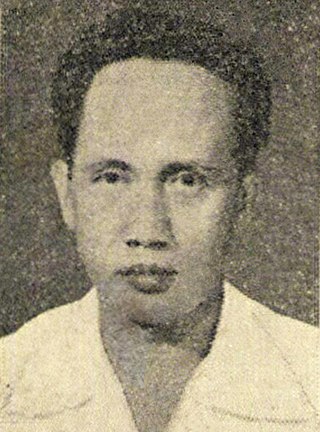
Hardi was an Indonesian politician who served as Deputy Prime Minister in the Djuanda Cabinet between 1957 and 1959 and Ambassador of Indonesia to Vietnam between 1976 and 1979.
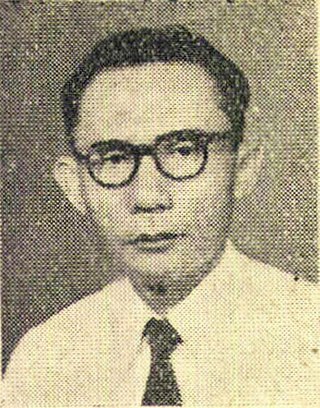
Osa Maliki Wangsadinata was an Indonesian politician who served as the chairman of the Indonesian National Party (PNI) and a deputy speaker of the People's Consultative Assembly (MPR) from 1966 until his death. Born in Padalarang, Osa was educated at a Taman Siswa school. He participated in an unsuccessful communist rebellion against the colonial government in 1926, being exiled to the Boven-Digoel concentration camp as a result. After returning from exile in 1938, he worked as a teacher. During the Japanese occupation, Osa worked in the propaganda section of a Hōkōkai and became a member of the Suishintai, however, he was briefly detained by the Kenpeitai over his connections to an underground resistance movement.

Prawoto Mangkusasmito was an Indonesian politician who served as the final chairman of the Masyumi political party before its dissolution in 1960. He also served as the Deputy Prime Minister of Indonesia during the Wilopo Cabinet between 1952 and 1953.
